Wave Arts MultiDynamics 7 v7.04 WiN
Soft / VST Effects
31-10-2023
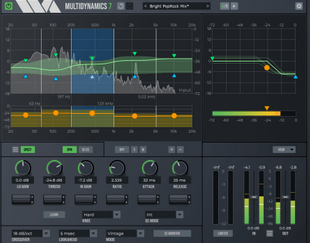
MultiDynamics 7 is a powerful multi-band dynamics processor useful for mastering, track processing, sound design, and noise reduction. MultiDynamics provides up to 6 bands with independent compression or expansion/gating per band.
Multiband dynamics processing combines the techniques of equalization and dynamics processing, but is more powerful than a static equalizer or a single band dynamics processor. Below are some of the possible ways to use MultiDynamics 7:
Frequency-dependent dynamics. A simple application of multiband dynamics is to apply compression or expansion to a specific frequency range. For example, you may want to compress the vocals in a mix without affecting the low frequencies (bass, kick drum) or high frequencies (snare, cymbals). This is easily done by creating a midrange band to cover the vocal range and setting it to compress.
Level-dependent EQ. You can also think of multiband dynamics as providing EQ which is dependent on the level of the input sound. For example, you might want to brighten the sound of a high hat, but only when the drums are played softly. This can be accomplished by setting up a high frequency band that increases gain when the input is below threshold. This is more powerful than using a shelving EQ which will change the tonal balance at all levels equally.
Noise reduction. Another powerful use of MultiDynamics 7 is noise reduction. This is accomplished using multiple gating bands where the thresholds are set just above the ambient noise level. MultiDynamics 7 excels at de-noising and doesn't suffer from artifacts typical of FFT-based de-noisers.
Ducking. You can use MultiDynamics 7 to duck music behind narration so the foreground dialog stays intelligible when mixed with the background music. Using a multiband processor allows the music to be ducked only in the frequency ranges where there is dialog energy, which makes for a more transparent effect.
HIGHLIGHTS
Up to 6 independent bands
Proprietary crossover filter network eliminates amplitude distortion between bands
6 dB/oct, 18 dB/oct, and 30 dB/oct crossover slopes
Full featured compressor or expander/gate per band
Clean and vintage compression modes
Supports external sidechain input and sidechain EQ filter
Adjustable knees and lookahead
Zero latency operation when lookahead is off
Latency compensation
Per band bypass, solo and mute controls
Comprehensive visualization of input levels and dynamic EQ response
Learn function to automatically set band thresholds
Realtime spectrum display
Output peak limiter
Level meters support Peak, Peak & RMS, RMS, and K-system
Some of what’s new in MultiDynamics 7:
All new interface with dark theme.
Now supports extensive sidechain capability. Each dynamics band can be driven from the input signal or an external sidechain input. You can also specify wide-band or band-filtered signal, or select either the input or external signal filtered by a separate sidechain EQ. Hence you can drive one frequency band based on the signal from another frequency band.
New Learn feature automatically sets band thresholds to detected peak or RMS levels.
A peak limiter has been added to the output processing.
Input meters and an input gain control have been added.
User selectable display ranges for dynamics gain and input levels.
New metering section with options for peak, peak & RMS, RMS, and K-system meters.
Realtime spectrum display with many options.
home page:
https://goo.su/Qd6T
Multiband dynamics processing combines the techniques of equalization and dynamics processing, but is more powerful than a static equalizer or a single band dynamics processor. Below are some of the possible ways to use MultiDynamics 7:
Frequency-dependent dynamics. A simple application of multiband dynamics is to apply compression or expansion to a specific frequency range. For example, you may want to compress the vocals in a mix without affecting the low frequencies (bass, kick drum) or high frequencies (snare, cymbals). This is easily done by creating a midrange band to cover the vocal range and setting it to compress.
Level-dependent EQ. You can also think of multiband dynamics as providing EQ which is dependent on the level of the input sound. For example, you might want to brighten the sound of a high hat, but only when the drums are played softly. This can be accomplished by setting up a high frequency band that increases gain when the input is below threshold. This is more powerful than using a shelving EQ which will change the tonal balance at all levels equally.
Noise reduction. Another powerful use of MultiDynamics 7 is noise reduction. This is accomplished using multiple gating bands where the thresholds are set just above the ambient noise level. MultiDynamics 7 excels at de-noising and doesn't suffer from artifacts typical of FFT-based de-noisers.
Ducking. You can use MultiDynamics 7 to duck music behind narration so the foreground dialog stays intelligible when mixed with the background music. Using a multiband processor allows the music to be ducked only in the frequency ranges where there is dialog energy, which makes for a more transparent effect.
HIGHLIGHTS
Up to 6 independent bands
Proprietary crossover filter network eliminates amplitude distortion between bands
6 dB/oct, 18 dB/oct, and 30 dB/oct crossover slopes
Full featured compressor or expander/gate per band
Clean and vintage compression modes
Supports external sidechain input and sidechain EQ filter
Adjustable knees and lookahead
Zero latency operation when lookahead is off
Latency compensation
Per band bypass, solo and mute controls
Comprehensive visualization of input levels and dynamic EQ response
Learn function to automatically set band thresholds
Realtime spectrum display
Output peak limiter
Level meters support Peak, Peak & RMS, RMS, and K-system
Some of what’s new in MultiDynamics 7:
All new interface with dark theme.
Now supports extensive sidechain capability. Each dynamics band can be driven from the input signal or an external sidechain input. You can also specify wide-band or band-filtered signal, or select either the input or external signal filtered by a separate sidechain EQ. Hence you can drive one frequency band based on the signal from another frequency band.
New Learn feature automatically sets band thresholds to detected peak or RMS levels.
A peak limiter has been added to the output processing.
Input meters and an input gain control have been added.
User selectable display ranges for dynamics gain and input levels.
New metering section with options for peak, peak & RMS, RMS, and K-system meters.
Realtime spectrum display with many options.
home page:
https://goo.su/Qd6T
Related articles
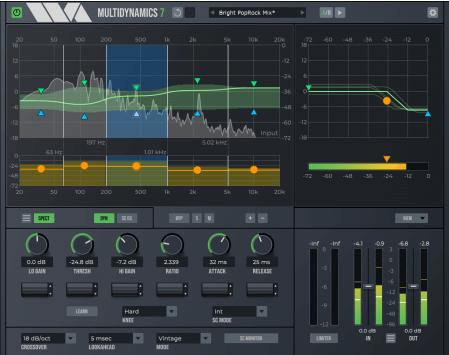 Wave Arts MultiDynamics 7 v7.03 WiN
Wave Arts MultiDynamics 7 v7.03 WiN
Soft / VST Effects
18-06-2023
MultiDynamics 7 is a powerful multi-band dynamics processor useful for mastering, track processing, sound design, and noise reduction. MultiDynamics provides up to 6 bands with independent compression or expansion/gating per band.
Multiband dynamics processing combines the techniques of equalization and dynamics processing, but is more powerful than a static equalizer or a single band dynamics processor. Below are some of the possible ways to use MultiDynamics 7:
Frequency-dependent dynamics. A simple application of multiband dynamics is to apply compression or expansion to a specific frequency range. For example, you may want to compress the vocals in a mix without affecting the low frequencies (bass, kick drum) or high frequencies (snare, cymbals). This is easily done by creating a midrange band to cover the vocal range and setting it to compress.
Level-dependent EQ. You can also think of multiband dynamics as providing EQ which is dependent on the level of the input sound. For example, you might want to brighten the sound of a high hat, but only when the drums are played softly.
Multiband dynamics processing combines the techniques of equalization and dynamics processing, but is more powerful than a static equalizer or a single band dynamics processor. Below are some of the possible ways to use MultiDynamics 7:
Frequency-dependent dynamics. A simple application of multiband dynamics is to apply compression or expansion to a specific frequency range. For example, you may want to compress the vocals in a mix without affecting the low frequencies (bass, kick drum) or high frequencies (snare, cymbals). This is easily done by creating a midrange band to cover the vocal range and setting it to compress.
Level-dependent EQ. You can also think of multiband dynamics as providing EQ which is dependent on the level of the input sound. For example, you might want to brighten the sound of a high hat, but only when the drums are played softly.
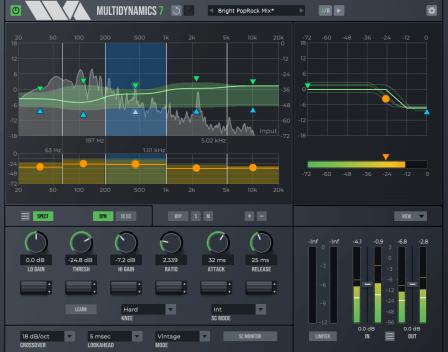 Wave Arts MultiDynamics 7 v7.02 WiN
Wave Arts MultiDynamics 7 v7.02 WiN
Soft / VST Effects
11-06-2023
MultiDynamics 7 is a powerful multi-band dynamics processor useful for mastering, track processing, sound design, and noise reduction. MultiDynamics provides up to 6 bands with independent compression or expansion/gating per band.
Multiband dynamics processing combines the techniques of equalization and dynamics processing, but is more powerful than a static equalizer or a single band dynamics processor. Below are some of the possible ways to use MultiDynamics 7:
Frequency-dependent dynamics. A simple application of multiband dynamics is to apply compression or expansion to a specific frequency range. For example, you may want to compress the vocals in a mix without affecting the low frequencies (bass, kick drum) or high frequencies (snare, cymbals). This is easily done by creating a midrange band to cover the vocal range and setting it to compress.
Multiband dynamics processing combines the techniques of equalization and dynamics processing, but is more powerful than a static equalizer or a single band dynamics processor. Below are some of the possible ways to use MultiDynamics 7:
Frequency-dependent dynamics. A simple application of multiband dynamics is to apply compression or expansion to a specific frequency range. For example, you may want to compress the vocals in a mix without affecting the low frequencies (bass, kick drum) or high frequencies (snare, cymbals). This is easily done by creating a midrange band to cover the vocal range and setting it to compress.
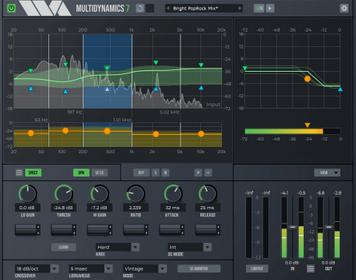 Wave Arts MultiDynamics 7 v7.01 WiN
Wave Arts MultiDynamics 7 v7.01 WiN
Soft / VST Effects
7-06-2023
MultiDynamics 7 is a powerful multi-band dynamics processor useful for mastering, track processing, sound design, and noise reduction. MultiDynamics provides up to 6 bands with independent compression or expansion/gating per band.
Multiband dynamics processing combines the techniques of equalization and dynamics processing, but is more powerful than a static equalizer or a single band dynamics processor. Below are some of the possible ways to use MultiDynamics 7:
Frequency-dependent dynamics. A simple application of multiband dynamics is to apply compression or expansion to a specific frequency range. For example, you may want to compress the vocals in a mix without affecting the low frequencies (bass, kick drum) or high frequencies (snare, cymbals). This is easily done by creating a midrange band to cover the vocal range and setting it to compress.
Level-dependent EQ. You can also think of multiband dynamics as providing EQ which is dependent on the level of the input sound. For example, you might want to brighten the sound of a high hat, but only when the drums are played softly. This can be accomplished by setting up a high frequency band that increases gain when the input is below threshold. This is more powerful than using a shelving EQ which will change the tonal balance at all levels equally.
Multiband dynamics processing combines the techniques of equalization and dynamics processing, but is more powerful than a static equalizer or a single band dynamics processor. Below are some of the possible ways to use MultiDynamics 7:
Frequency-dependent dynamics. A simple application of multiband dynamics is to apply compression or expansion to a specific frequency range. For example, you may want to compress the vocals in a mix without affecting the low frequencies (bass, kick drum) or high frequencies (snare, cymbals). This is easily done by creating a midrange band to cover the vocal range and setting it to compress.
Level-dependent EQ. You can also think of multiband dynamics as providing EQ which is dependent on the level of the input sound. For example, you might want to brighten the sound of a high hat, but only when the drums are played softly. This can be accomplished by setting up a high frequency band that increases gain when the input is below threshold. This is more powerful than using a shelving EQ which will change the tonal balance at all levels equally.
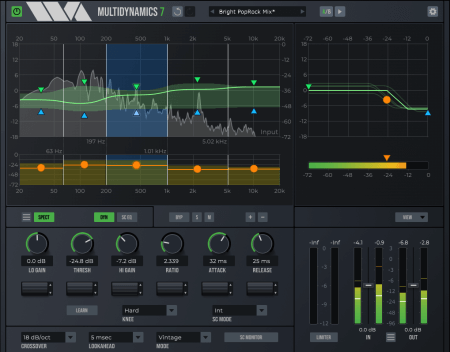 Wave Arts MultiDynamics 7 v7.00 WiN
Wave Arts MultiDynamics 7 v7.00 WiN
VST Effects / VST Plugins / Audio Soft
3-06-2023
MultiDynamics 7 is a powerful multi-band dynamics processor useful for mastering, track processing, sound design, and noise reduction. MultiDynamics provides up to 6 bands with independent compression or expansion/gating per band.
Multiband dynamics processing combines the techniques of equalization and dynamics processing, but is more powerful than a static equalizer or a single band dynamics processor. Below are some of the possible ways to use MultiDynamics 7:
Multiband dynamics processing combines the techniques of equalization and dynamics processing, but is more powerful than a static equalizer or a single band dynamics processor. Below are some of the possible ways to use MultiDynamics 7: